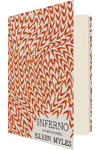You have reached your article limit
Sign up for a digital subscription and continue reading all new issues, plus our entire archives, for just $1.50/month.
Already a subscriber? Sign in


Desire isn’t cool. It’s angsty, sweaty, physically uncomfortable. In Eileen Myles’s Inferno (A Poet’s Novel), the sincerity of the narrator’s yearning—for women, for poetry—might tilt into sentimentality were it not for the casual disarray of the prose: a cool envelope for a burning missive. Earnestness is offset by wit, lyricism by dry commentary, and always there is the marvelous dishevelment of Myles’s sentences, as commas are willfully dropped, clauses fused, and one tense shades obliquely into another.
The narrative, split into three looping, iterative sections, describes Eileen’s development as a poet and lesbian, and though the story spans a good twenty years, the denouement presented toward the end occurs near its calendar beginning, when Eileen first discovers sex with women. (Yes, the narrator is named Eileen Myles, but if this is metafiction it wears its meta lightly. Myles’s decision to name her protagonist after herself in a story that resembles her own feels as offhand as any of her other formal choices. Inferno is less concerned with disputing genre property lines or puncturing a fictional dream than with creating the conditions necessary to tell its version of truth.) Becoming a lesbian is correlated not with becoming a poet—when Eileen first sleeps with a woman, she already is one—but with the poet’s becoming conscious of how she makes poems. Sex deepens Eileen’s sense of her own artistic program, an awareness rendered in wedges of thought alternately lyrical and awkward: “I looked at the poem I held in my hand. A tiny bone. It looked a little thin. The thing is you couldn’t have all the fragments be the same size, right. Why would you do that. That’s just pathetic. Obtuse.” We witness her fumbling toward an idea, arriving. “I needed to win in some reverse way,” she muses, a bit mysteriously. “I like sentences. Words. Like this walk. I don’t see everything. And certainly not for the same length of time. What do I see? If I am going to be a lesbian, it will be everywhere in my work. Embedded, and I laughed.”
Also visible is the apparent residue of the creation of the book itself. After a riff on a dinner party, improbably told in the voices of a handful of fish—arguing, sucking morosely at the glass of their tank—Eileen reviews the fragment and, with characteristic bravado, approves it. “Yup,” she crows, “this will definitely go in.” Deciding what comes out isn’t any harder. When Eileen and her friend James sit down to look at her work, James wants to cut: “Do you mind, he asked, aiming at my poem.” She doesn’t. James applies his white out. “Take that one too I said, egging him on. Really. Now I wouldn’t do that, he said.” But Eileen is being cheeky. “Go ahead,” she says. “What did I care if my poem had a lot of words in it or not.”
The looseness of the language has a downside. Referents are sometimes murky, pronouns gesture to missing antecedents. It can be hard to tell what exactly Myles means. This fuzziness limits the power of the book, but not fatally. Inferno is too exuberant for that, its sexual swagger too appealing. Near the end, Eileen asks her friend Tony what to do about wanting a certain woman. “Proclaim it,” he says, and she realizes, “I didn’t have to get the person. What you needed to do was announce your feelings, that was the truth.” Eileen frees herself as a poet when she understands that the same declarations are required of poetry; it, too, is a libidinal inclination toward the world, an announcement of love and hunger. The same can be said of the poet’s novel.
—Emily Cooke
Sign up for a digital subscription and continue reading all new issues, plus our entire archives, for just $1.50/month.
Already a subscriber? Sign in